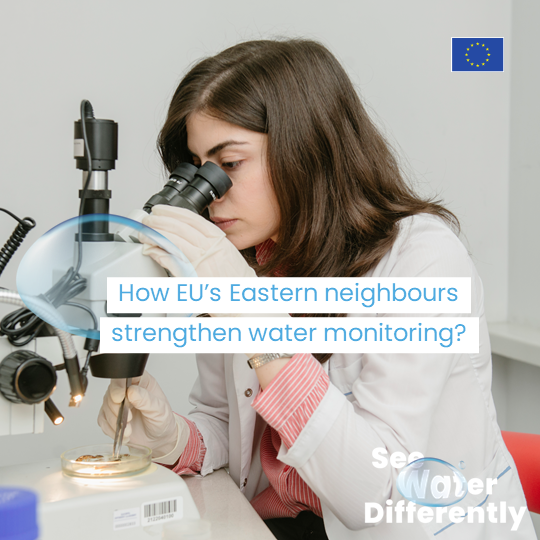Water quality is a vital indicator of a country's health. In Armenia, Azerbaijan, Georgia, Moldova, and Ukraine, intensive agriculture, growing industrialisation, urbanisation, and the impacts of war have exacerbated water pollution.
Inadequate wastewater treatment and climate change have led to significant water quality challenges, affecting irrigation and drinking water. However, the 'EU4Environment - Water Resources and Environmental Data' programme has significantly improved water monitoring capacities in the Eastern Partnership (EaP) countries.
Accounting for ecosystem services
Water quality monitoring is essential for assessing the health of water resources. It involves repeated sampling at various sites, conducting laboratory analyses, and interpreting and reporting data to understand how waste residues, pesticides, and pharmaceuticals impact aquatic ecosystems and human health. However, gathering comprehensive water quality data is complex.
Historically, water quality monitoring in the EaP countries has focused on a few physico-chemical parameters, ignoring river biology (the fauna and flora) and its hydromorphology (the course the river takes, the natural or altered shape of the river channel).
The EU Water Framework Directive (WFD) introduced ecological monitoring, which combines these parameters to investigate river systems comprehensively. The EU approach of "ecological monitoring" provides a more complete picture of water health. It takes into account the ecosystem services of rivers and lakes, which enable them to withstand disturbances and provide economic benefits to people, such as clean water, biomass production, and reduced flood risk.
Alexander Zinke from the Environment Agency in Austria said: “Austrian know-how transfer helps EU Eastern Partnership countries, such as the Republic of Moldova or Ukraine, to stepwise upgrade their water management for the EU Candidate status.”
Extending data collection
The 'EU4Environment - Water Resources and Environmental Data' programme has been a game-changer, extending the scope and quality of water monitoring in the EaP countries to get closer to EU Water Framework Directive standards.
In 2023 and 2024, surface water and groundwater surveys were conducted in the five EaP countries. These surveys created a valuable database for developing new assessment methods in line with the EU directives.
It's crucial to monitor not only rivers and lakes but also groundwater. Groundwater is often an overlooked resource and the database for it is still weak in all EaP countries. Accurate knowledge of groundwater is increasingly important as groundwater exploitation rises and natural recharge decreases due to climate change.
Building capacity for accurate lab analysis
Extensive training provided by the 'EU4Environment –Water Resources and Environmental Data' programme has equipped local experts with the skills needed for systematic field surveys across river basins and diligent laboratory analyses. This ensures accurate water quality assessments and comparable results, meeting the stringent requirements of the EU Water Framework Directive. Participants have learned advanced testing methods, including the use of analytical equipment, sample preparation, result interpretation, and quality assurance procedures.
The accreditation of laboratories, such as the one in Vyshgorod, Ukraine, confirms that the analytical results are trustworthy, allowing policy decisions to be based on solid scientific evidence.
Knowledge-based policymaking is crucial for effective water management, both across the EU and its neighbourhood. Improving the monitoring programmes and building the capacity for EaP experts will ensure reliable data for water use decisions, better protection of river ecosystems, support for public health and sustainable economic activities that depend on clean water.
For more info
Details
- Publication date
- 29 July 2024
- Author
- Directorate-General for Environment


